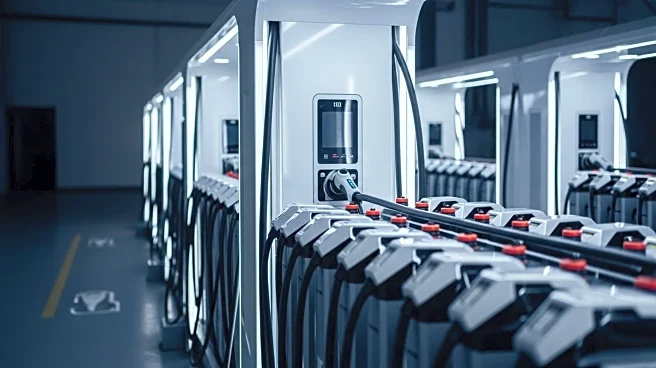What's Happening?
Workers at the Blue Oval SK electric vehicle battery manufacturing plant in Kentucky are set to vote on forming a union this week. The plant, a joint venture between Ford Motor Company and South Korea's SK Group, is located in Hardin County and is expected to employ around 5,000 people. Employees, like Haley Hadfield, express a desire for recognition and fair treatment, citing concerns about being treated as expendable assets. The unionization effort is supported by local communities, as a report from the Kentucky Center for Economic Policy highlights a decline in good jobs and wages in the automotive industry over the past decade. The unionization vote comes in the context of broader industry changes, including the impact of climate legislation under President Joe Biden, which provides clean manufacturing credits to bolster the domestic battery supply.
Why It's Important?
The unionization vote at the Blue Oval SK plant is significant for several reasons. It reflects a growing movement among workers in the electric vehicle (EV) sector to seek better working conditions and job security. A successful unionization could set a precedent for other EV manufacturing facilities, potentially leading to improved labor standards across the industry. This development is also crucial for Kentucky's economy, as the state has invested heavily in the automotive sector, including $250 million in corporate subsidies for the plant. The outcome of the vote could influence the state's ability to attract and retain similar investments in the future. Additionally, as the U.S. aims to compete with China in the global EV market, ensuring a stable and satisfied workforce is essential for maintaining production efficiency and innovation.
What's Next?
If the unionization vote is successful, negotiations between the workers and management at Blue Oval SK will likely commence to establish a collective bargaining agreement. This could lead to changes in wages, benefits, and working conditions at the plant. The outcome may also prompt other EV manufacturing facilities to consider unionization, potentially reshaping labor relations in the industry. Additionally, the broader implications for Kentucky's economy and its role in the EV market will be closely monitored by industry stakeholders and policymakers. The state's ability to balance labor interests with economic growth will be critical in maintaining its position as a key player in the automotive sector.










